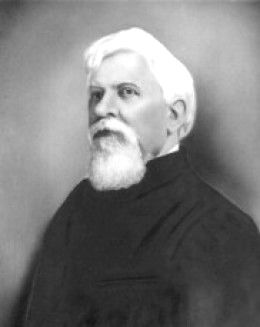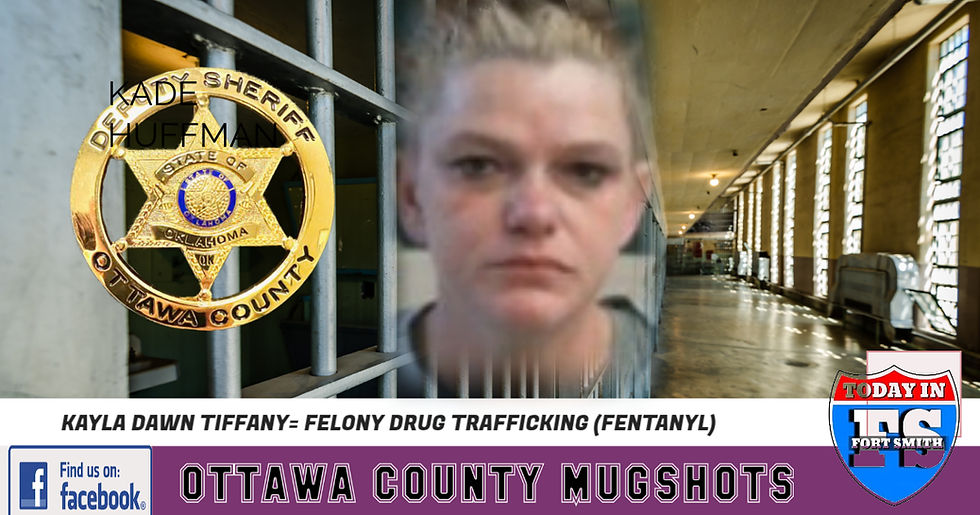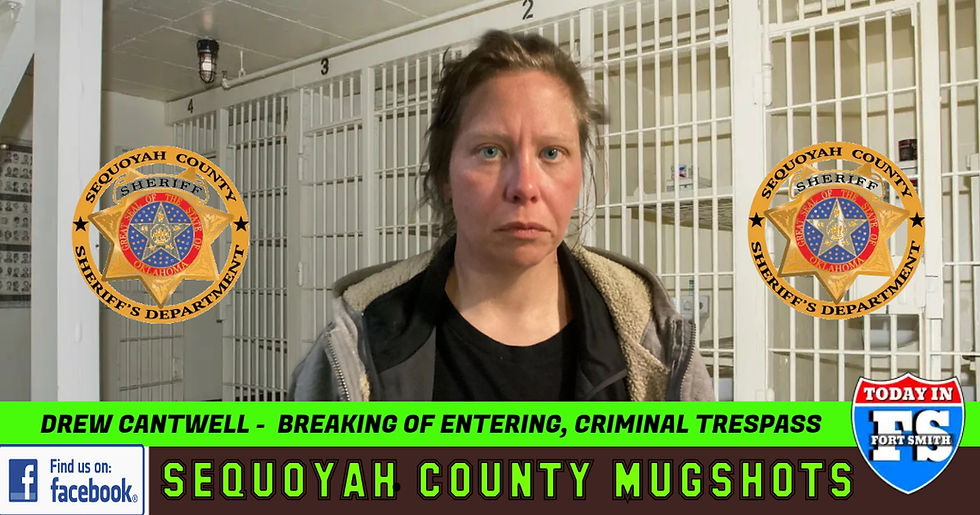The turbulent life and rope-aided death of Oklahoma outlaw Crawford "Cherokee Bill" Goldsby
- Dennis McCaslin

- Sep 19, 2023
- 5 min read
Updated: Sep 19, 2023



Historical records tell us that on the morning of March 17, 1896 the temperature in Fort Smith was 51° as people streamed into the community from all over Western Arkansas and the then Indian Territory for "the event". That event wasn't horse races at the old Electric Park on what later become Midland Boulevard. It wasn't a religious gathering, or even a convention or political rally, which were so prevalent in those times. Indeed, the crowd -- which was said to have been more than 3,000 people --poured into the border town in order to witness the hanging of Crawford "Cherokee Bill" Goldsby who blazed his way into local history and to a somewhat nefarious reputation as an old west outlaw with a career that lasted less than three years but brought chaos and havoc to the Western District of Arkansas as well as the immense Indian Territory to the west. Goldsby, a mix breed Cherokee of native American, African-American, and white blood, had been born in Texas to George and Ellen Beck Goldsby in 1876.
His father had been a Buffalo Soldier for the Union forces after having served as a servant in the Confederate army before fleeing to the Union side at the Battle of Gettysburg

In 1878, George Goldsby was implicated in an affair in Texas which led to a confrontation between members of the Army, local hunters, and local cow punchers. Facing court-martial, he fled into Indian Territory around the Fort Gibson area. Crawford, who would grow up to become Cherokee Bill, was left behind with an African-American family until the age of seven and didn't rejoin the family until after the age of 12 when he returned home after spending five years in the Cherokee Nation Indian School in Cherokee, Kansas.

At the age of 18, at a dance in Fort Gibson, Crawford Goldsby's life as an outlaw began. A man by the name of Jake Lewis was also at the dance and got into a confrontation with one of Crawford's younger brothers. A few days later, Crawford hunted down Lewis and shot him on the streets of Fort Gibson. Lewis survived, but it wasn't the last time Cherokee Bill would send hot lead into the body of someone opposed to him.
He shortly after threw in with the Bill Cook gang, and they terrorized the Indian Territory from late May 1894 through December of that year. The crime that landed him in real hot water with the Western District of Arkansas and Judge Isaac C. Parker was the killing of an innocent bystander at Lepanah, IT on November 8, 1894

Goldsby and the gang of desperados had ridden up to the Schubfelt and Son general store on the main street of Lepanah that morning. Goldsby, Bill Cook, and one of the other outlaws went inside the mercantile and we're in the process of robbing the establishment when local citizen Ernest Melton happened onto the scene. Court records indicate that Cherokee Bill put a slug from a Winchester rifle through Melton's head, the first murder that could be attributed to the outlaw that could be proven in a court of law..
The Melton murder put the onus on the deputies of the US District Court to try and capture the outlaws, or at least break up the gang. Over the next few months most of the men were captured or killed but Goldsby always managed to escape. When the reward on Cherokee Bill's head hit $1,300, some of his acquaintances seem much more willing to cooperate with the manhunt.

Former US deputy Ike Rogers lived near Nowata and had a comely niece who had caught the eye of Cherokee Bill.
At the encouragement of US Deputy Marshal Bill Smith, Rogers used the hospitality of his home and the lure of the attractive young lady as a way to entrap the outlaw.
Rogers and another man by the name of Clint Scales captured Goldsby as he squatted by a fireplace while attempting to light a cigarette. An infamous photo of Cherokee Bill and a group of deputies who were in on the subterfuge was taken at the Wagoner train station before they started their journey back to Fort Smith.

In that photo, Goldsby willingly posed with his arm around one of the deputies.
Seconds after this photo was snapped he tried to snatch the deputy's six shooter from his holster and had to be forcibly taken to the ground by the rest of the lawman. Once in jail in Fort Smith, Goldsby was found guilty of the murder of Ernest Melton during the Lepanah store robbery and sentenced to hang. The day after that verdict, one of Goldsby's brothers shot ex-deputy Ike Rogers in the back of the head, killing him in cold blood at the Nowata train station.

A defense attorney by the name of J. Warren Reed, who is said to have been Judge Parker's arch-nemesis in the courtroom, was hired by Goldsby's mother and earned a stay of execution on appeal in the Melton murder.
Before that appeal could work its way through the court system, Goldsby attempted a daring escape from his first -floor jail cell in the stockades adjacent to the courtroom. Goldsby had convinced a trustee to snuggle in a firearm and on July 26, 1895 he shot and killed jailer Larry Keating during a failed attempt to break out of jail.
Another old west outlaw by the name of Henry Starr was able to bring the situation to a peaceful resolution when he convinced authorities to let him talk Goldsby into surrendering his weapon.

Of all the killings in his district this one angered Isaac Parker the most. Although Goldsby was already on the hook for the Melton murder and seemingly bound for execution, Parker insisted that the court try him again for the death of Keating. "The courts delay in acting on appeals gives murderers a long breathing spell," Parker said, "Which in this case meant death for a citizen whose life was worth more to the community and to society at large then the lives of 100 murderers." The ensuing trial set records for the Fort Smith court. From the time of Keating's death until Goldsby had his second order of execution issued was exactly 16 days. It was the only murder prosecuted in judge Parker's court that occurred in Arkansas, possible since it had occurred on United States property.

"Cherokee Bill.. your rebellious destruction of human life in the many murders you have committed, and their reckless and wanton character show you to be a human monster", said Judge Parker. "You most wantonly and wickedly stole the life of a brave and true man. You most wickedly slew him in your mad attempt to evade the punishment justly do you for your many murders."
Attorney Reed won yet another stay of execution in the case, but the Supreme Court later upheld the sentence in the Melton murder.
Goldsby was set to die at 11:00 a.m. on the day of his execution. One of his sisters, who was coming to witness the spectacle. was on a train that was delayed so the court allowed three more hours before the walk to the gallows. It's been said that within moments after the arrival of Goldsby's sister, the shackled man was led from the jailhouse to the gallows.

Defiant to the end, Cherokee Bill climbed the 13 steps of the scaffold, and before the hood was put over his face and the noose around his neck addressed the crowd when asked if he had any last words. "I didn't come here to make a speech. I came here to die." Moments later, hangman George Maledon sent Goldsby on the final trek of his short journey as an outlaw. He dropped the outlaw six- feet through the trap door, snapping his neck instantly. Cherokee Bill's body was claimed by family members and put on a train back to Fort Gibson where he was buried in the Cherokee National Cemetery.



